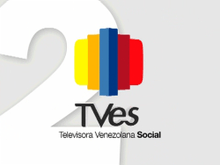TVes
|
| |
| Caracas, Venezuela | |
|---|---|
| Slogan | Sonríe Contigo |
| Channels |
Analog: 2 (in Caracas), 7 (in San Cristóbal, Táchira) Digital: Supercable, Intercable, NetUno, Other Signals: 2; DirecTV: 104 |
| Owner | Venezuelan Social Television Foundation, Government of Venezuela |
| Founded | May 28, 2007 |
| Website | http://www.tves.gob.ve/ |
TVes is a Venezuelan public television channel. Its name is short for Televisora Venezolana Social (Venezuelan Social Television) and is pronounced [ˈte ˈβes] ("te ves"), meaning you see yourself. It replaced the signal of Radio Caracas Televisión on Channel 2 on Monday, May 28, 2007, and began broadcasting at 12:20 am local time (04:20 UTC). The Venezuelan government had refused to renew RCTV's broadcasting license and instead determined to create a new channel from part of RCTV's infrastructure. The new channel, in contrast with RCTV, is public-owned. According to the government, TVes aims to portray the identity of Venezuelans, hence the pronunciation of the station's name meaning you see yourself.

Management
The station is managed by the Venezuelan Social Television Foundation (Fundación Televisora Venezolana Social), a foundation established under Presidential Decree 5394, published in the Gaceta Official government gazette on 11 May 2007. The Foundation has its own funds and separate legal identity (personalidad jurídica y patrimonio propio) and is attached to the Ministry of Communications and Information. Its initial funding came entirely from the Ministry, but in future years, it'll receive an allocation from the federal budget, together with such other donations and earnings it receives. The Foundation is based in Caracas but may conduct business throughout the republic and abroad.[1]
The members of the Foundation's board were sworn in by Vice President Jorge Rodríguez on 21 May 2007. The board members are Tarik Souki Farías, Roberto Hernández Montoya, Asalia Venegas, Rafaela Cusati, María Alejandra Díaz Marín, Nelín Escalante, Amilio Ezequiel González, Jorge Morales and Manuel Fernando, with journalist and broadcaster Lil Rodríguez serving as its president.[2]
As of today, the network is totally independent, and operates within the building of public television network Venezolana de Television, both fully funded by the Venezuelan government.
Programming
TVes has planned a schedule with many different types of programming, including news, sports, movies, music, drama and children's shows. The network says that it'll reflect Venezuela's social diversity and provide a forum for independent producers. TVes will also air content from the National Geographic Channel on weekday mornings.[3]
TVes director Asalia Venegas said the new network should bring Venezuelan television closer to a European model, in which the state takes an active role in education and cultural promotion, as opposed to the commercial television of U.S. capitalism.[4]
In its first month of operation, the channel has shown a wide range of programmes from countries all around the world, including French cartoons, Brazilian puppet shows, Argentinian soaps and Soviet movies.[5] In June 2007, TVes held its first major event as the official network of the Copa América football tournament, which is being held in the country.
Even though the station operates on a 24-hour schedule, the TVes plays the national anthem 3 times a day (at 6:00 AM, noon, and midnight).
While ratings figure are not available yet, The Economist claimed in July 2007 (2 months after the channel was founded) that TVes has failed to catch on with Venezuelans, with the station struggling to reach 10% of RCTV's viewers.[6]
References
- ↑ Presidencia crea Fundación Televisora Venezolana Social, Las Noticias de Cojedes, 14 May 2007.
- ↑ Juramentada directiva de la Fundación Televisora Venezolana Social, TeleSUR, 21 May 2007.
- ↑ TVes Programming Schedule (Spanish)
- ↑ "TVes should differentiate itself from U.S. commercial capitalist model," Agencia Boliviariana de Noticias, 28 May 2007 (Spanish)
- ↑ "Flares and medallions live again on Chavez's socialist TV" The guardian, 10 June 2007
- ↑ "Broadcast battles: Rebirth of a television station" The Economist, 19 July 2007
External links
| ||||||||||||||